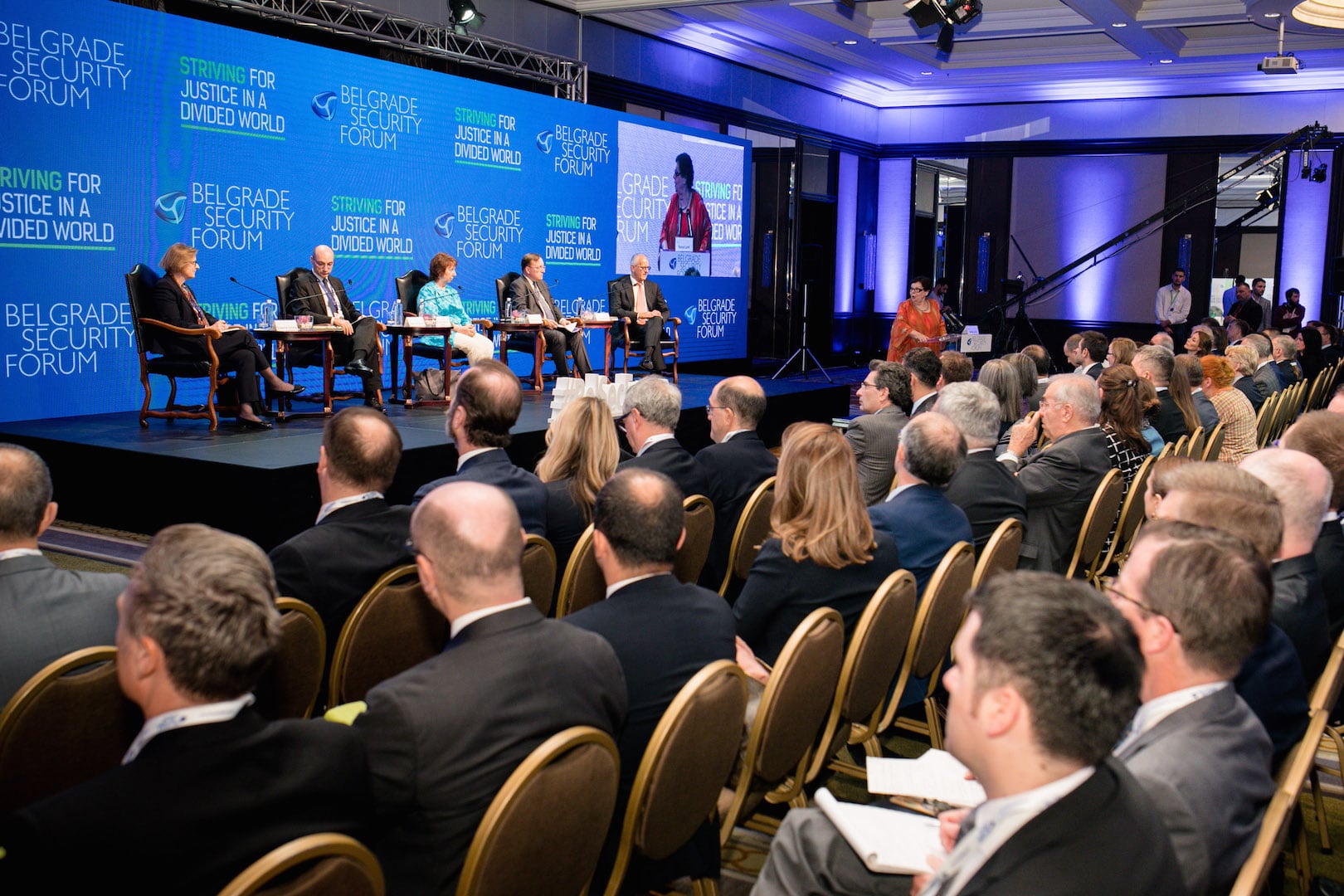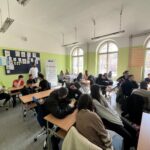Photo: A. Andjic/BSF
The biggest mark on this year’s forum was made by the EU’s decision not to open negotiations with Northern Macedonia and Albania, which has raised concerns for many panelists about the future of the Western Balkans. BSF participants also called on the EU to increase engagement in the region and warned that its credibility could be compromised if it does not deliver on its promises.
Prepared by: Ivana Pejcic, Novi magazin weekly
Regional security, the sustainability of the concept of military neutrality, the situation in the European Union and the Western Balkans 15 years after the Big Bang enlargement, as well as the normalization of Belgrade-Pristina relations, are just some of the topics discussed at the 9th Belgrade Security Forum (BSF).
This three-day Forum entitled “Striving for Justice in a Divided World” was held from 16 to 18 October this year at the Hyatt Hotel. It is the one of a kind event resulting from the civil society organizations initiative – the Belgrade Fund for Political Excellence, the European Movement in Serbia and the Belgrade Center for Security Policy.
THE UNCERTAINTY OF THE EUROPEAN PERSPECTIVE: The biggest mark on this year’s forum was made by the EU’s decision not to open negotiations with Northern Macedonia and Albania, which has raised concerns for many panelists about the future of the Western Balkans. Besides, in the closing remarks, BSF participants also called on the EU to increase engagement in the region and warned that its credibility could be compromised if it does not deliver on its promises.
Vice President of the European Movement in Serbia Vladimir Medjak said at the closing address that the participants of the Forum said that the EU is not complete without all the countries of the Western Balkans and that the region’s future is in the EU. One of the conclusions is that the integration of the Western Balkans is in the security, political and economic interests of the Union.
“The enlargement policy is the exact point at which the EU’s global credibility can be called into question,” concluded Medjak.
“If the EU fails to deliver on its promises after some of the Western Balkan countries have made historic compromises and implemented the necessary reforms, it will strengthen anti-European forces promoting nationalism and the irresponsible behavior of political elites. If the EU intends to move towards geopolitical action, the integration of the Western Balkans should be the first step in that direction, ” was one of the Forum’s conclusion. He added that “the freezing of the EU enlargement process is irresponsible and counterproductive to the fragile peace in the Western Balkans.”
Accordingly, the Belgrade Security Forum urged the Union not to delay the opening of accession negotiations with Northern Macedonia and Albania and to grant visa liberalization to Kosovo citizens. It has been estimated that the EU accession process, as it has been so far, does not work properly and has unintended consequences in the development of undemocratic tendencies and the capture of the state, and that for enlargement to succeed, more determined political leadership and vision is needed, both in the EU and in aspiring countries.
“Instead of merely fulfilling the formal requirements for membership, the enlargement process must lead to fundamental and consistent changes in the aspiring EU countries. In addition to rigorously assessing progress in areas crucial to the rule of law, it is also necessary to monitor strengthening or impairing of the functionality of democratic institutions and whether there is a interlinkage of reforms in all areas, such as media freedom, the independence of the judiciary and the police, ” was added in the BSF conclusions.
Mr Medjak also conveyed the Forum’s view that, in time of numerous challenges to democracy worldwide, the EU is still striving hard to preserve democratic values and standards, and that implementing a new agenda for maintaining the rule of law within the EU would enhance the credibility of the Union as a promoter of democracy and the rule of law at the global level, and especially in the Western Balkans.
RED LINES: Former EU High Representative Catherine Ashton has received particular media attention this year in the panel on “Sustainable Solutions for the Western Balkans”. Her arrival reminded all participants that a dialogue between Belgrade and Pristina in 2012, whose epilogue was the Brussels Agreement, began under her auspices. Six years after the Agreement, Ashton said that no one then asked negotiators to cross their red lines and that the goal was to at least bring the representatives of the two sides to the same room, for the same table. She added that at no point was it required to cross the red lines they had – that Serbia was not required to recognize Kosovo, neither was Kosovo to deny itself as a state. It was an extraordinary thing for them, as she recalled the beginnings of the conversations, stating that the photo itself, after reaching the first Brussels Agreement, sent a strong message in itself.
Referring to the first Brussels Agreement and the fact that since then it has been six years, and since it has still not been implemented, she stressed the importance of the arrangements being implemented as they should make life easier for ordinary people. “It was the first agreement, it was by no means the idea to be the last,” Ashton said.
State Department Representative David Kostelancik also participated in the same panel, he stressed that normalization of relations is their strategic priority, and that both Pristina and Belgrade are their partners.
“We hope that a unified government will be formed in Kosovo that will be ready for dialogue and to suspend tariffs. The US will always support Kosovo’s independence, but we have made it very clear to Pristina that there is no path to a future that excludes reconciliation with Serbia. Now is a real opportunity to continue the dialogue, we should not gamble because a lot of attention will be paid to it in the coming months, ” Kostelancik said.
The necessity to continue the dialogue was discussed by the Director of the Continental Europe Directorate of the Ministry of Foreign Affairs of France, Frederick Mondoloni.
“The dialogue needs to be continued as soon as possible. We want to organize a meeting, together with Germany, if it can speed up the process. France fully supports the EU’s mediation in dialogue and the process should be coordinated with the US, ” Mondoloni stressed.
WITHOUT A FAST SOLUTION: The participants in the panel “Belgrade and Pristina – Comprehensive Normalization” also warned of the possible harmful consequences of the EU’s decision not to start negotiations with Northern Macedonia and Albania for the dialogue between Serbia and Kosovo. Although they share a common view, panel members did not agree on how Albin Kurti’s appointment as prime minister would affect the dialogue. Some believe that this could be a chance for new dialogue, despite harsh rhetoric, while others continue to expect difficulties in this relationship, as well as in both sides relations with the international community.
Political analysts Agon Maliqi and Stefan Surlic, as well as journalists Una Hajdari and Milica Andric Rakic spoke about this and the loss of European credibility. Panel participants felt that continuing the dialogue required a new framework and that an evaluation of the agreements reached so far could be a good starting point for this.
“I think one of the first things we can expect from Kurti and Vucic’s first meeting is what Kurti built his legacy on – which is radical transparency. In all his post-election interviews, he said he would include this in dialogue – radical transparency, ” Hajdari says. She believes that Kurti’s radical transparency may also change the EU’s approach to dialogue because “if one party talks transparently about it, it can change the spirit of the dialogue.” She also points out that neither Pristina nor Belgrade can no longer “sell” difficult compromises to the public in the name of European integration, because no one will buy it anymore. The dialogue must be restructured, she adds, and both parties must be honest with their populations. She believes that until a political agreement is reached, a kind of Marshall Plan for the Western Balkans should be introduced to eliminate the threat of nationalism through investment and, practically, a better life.
Milica Andric Rakic pointed out that what is now happening in Kosovo is reminiscent of the 2012 events in Serbia: “There are many tensions regarding Kurti and he may become the“ new Vucic ”in Kosovo. But I think Kurti will be unpleasantly surprised when he realizes how much he cannot do from what he expected he can and only then will he understand his new position. ”
She adds that Kurti has been in opposition for 10 years, so he never had the responsibility of running the government, and never had to deal with the intricate Kosovo administrative system, especially in the part concerning the rights of Kosovo Serbs.
Apart from different views, the participants in this panel have a common conclusion. In any case, they do not expect a rapid resumption of dialogue – first because of the government formation process in Kosovo and then because of the elections in Serbia.
The Ninth Belgrade Security Forum was marked by numerous panels and interesting topics, as well as academic discussions on, among other things, environmental security in light of current climate change and the role of women in peacebuilding processes in the Balkans. This year’s Forum brought together 350 participants and about 100 speakers from 30 countries. More than 150 journalists from 13 countries reported from the event. The success of this gathering, for nine years in a row, confirms that the next, the 10th Belgrade Security Forum, which will be held from 21 to 23 October 2020, in accordance with tradition, will again throw new light on regional and world problems next year.
Since the first in 2011, the Forum has been one of the most prestigious security and foreign policy developments in Southeast Europe. Each year, a few hundred speakers and participants, including decision makers and policy makers, representatives of security institutions, civil society, the international and academic community from Serbia and the region, as well as other parts of Europe and the world.













